Don't wanna be here? Send us removal request.
Text
Mastering Lifecycle Marketing: How to Win at Every Stage of the Customer Lifecycle
In today’s competitive business world, it’s not enough to simply attract new customers. To build a successful brand, you need to guide people through the entire customer lifecycle—from first contact to loyal fan. That’s where lifecycle marketing comes in.
Lifecycle marketing is the strategy of delivering the right message to your customers at the right time based on where they are in their customer lifecycle. Instead of one-size-fits-all marketing, it’s about personalizing the customer experience from beginning to end.
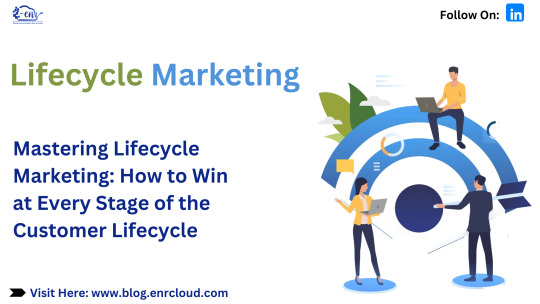
0 notes
Text
The Ultimate Guide to Customer Retention: Strategies That Work
In the competitive world of business, acquiring new customers is important—but keeping them is even more vital. Customer retention is the key to long-term success, brand loyalty, and sustainable growth. This guide breaks down the most effective strategies to improve customer retention and boost your bottom line.
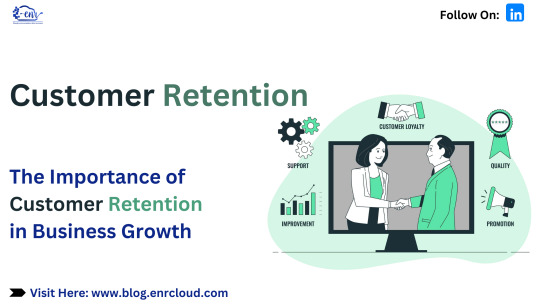
0 notes
Text
Navigating the Automation Landscape with Intelligent Automation
Intelligent Automation is revolutionizing the automation landscape by integrating AI and machine learning into traditional processes. This fusion enables businesses to automate complex tasks, enhance decision-making, and improve efficiency. As the automation landscape evolves, Intelligent Automation stands out by offering adaptive solutions that learn and improve over time. Embracing this technology allows organizations to stay competitive, reduce operational costs, and deliver superior customer experiences. Understanding the role of Intelligent Automation in the broader automation landscape is crucial for businesses aiming to innovate and thrive in the digital age.

0 notes
Text
Unlocking the Benefits of Artificial Intelligence in Marketing Automation
Integrating Artificial Intelligence (AI) into marketing automation offers transformative advantages for businesses. AI enhances efficiency by automating repetitive tasks, enabling marketers to focus on strategic initiatives. It provides data-driven insights, allowing for personalized customer experiences and real-time campaign optimization. AI-powered tools streamline operations, reduce costs, and improve return on investment (ROI) by targeting the right audience with precision. Moreover, AI facilitates scalability, ensuring consistent performance as businesses grow. By leveraging AI in marketing automation, companies can stay competitive, adapt to changing market dynamics, and deliver value-driven results.
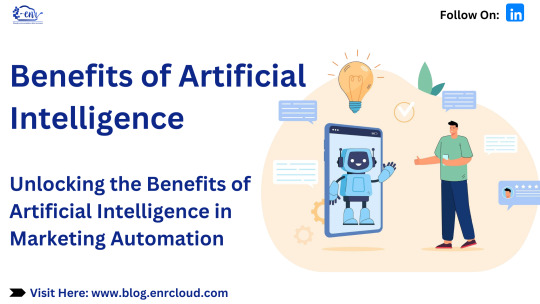
0 notes
Text
AI Agents Revolutionizing Marketing, Commerce, and Customer Service
AI agents are transforming the landscape of marketing, commerce, and customer service by automating tasks, personalizing customer interactions, and enhancing operational efficiency. In marketing, AI agents analyze consumer behavior to deliver tailored content and optimize campaign strategies. In commerce, they streamline processes like inventory management and order fulfillment, adapting in real-time to market demands. For customer service, AI agents provide 24/7 support, handling inquiries through natural language processing and learning from interactions to improve over time. Companies like Salesforce and Walmart are integrating AI agents to handle a significant portion of customer interactions, leading to increased satisfaction and reduced operational costs. As AI technology continues to evolve, its role in these sectors is expected to expand, offering businesses a competitive edge in delivering personalized and efficient services.
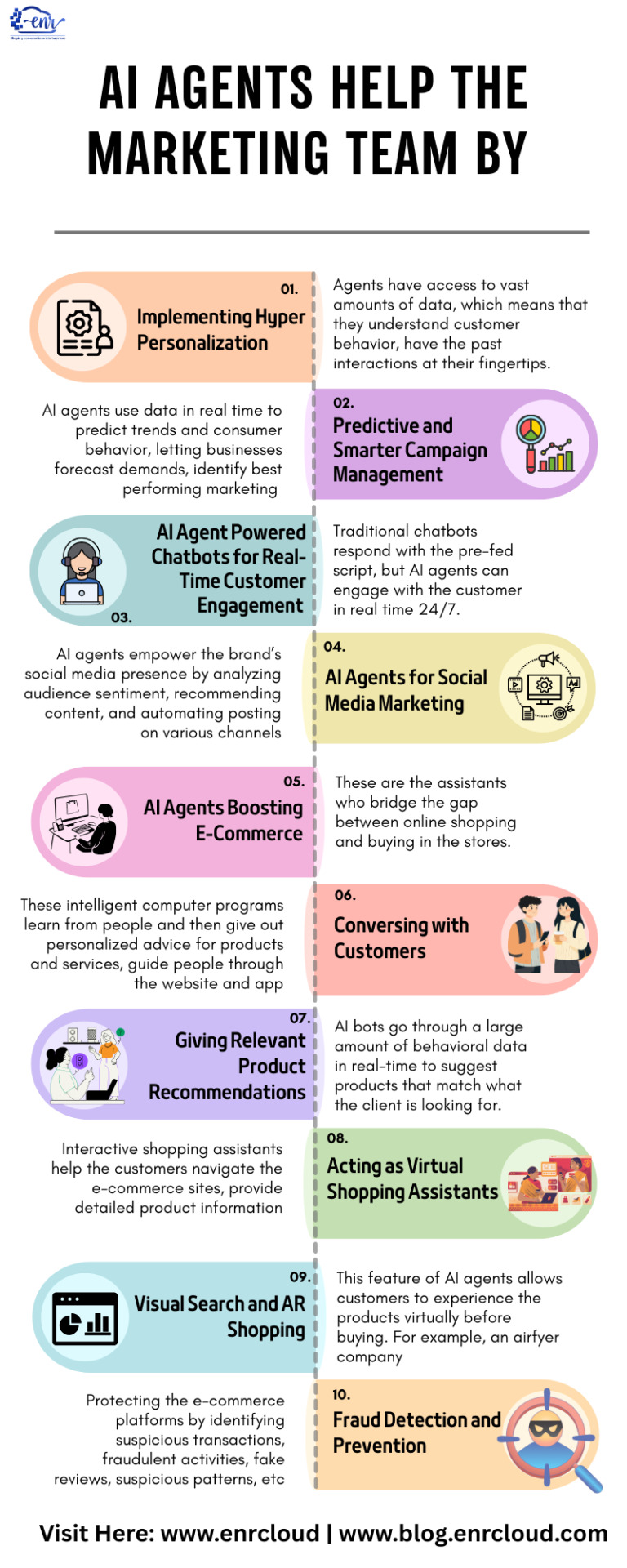
0 notes
Text
Segmentation Marketing: How Smart Segmentation Boosts Business Results
Segmentation Marketing is the key to reaching the right audience with the right message. By using segmentation, businesses can divide their market into smaller groups based on factors like demographics, behavior, or interests. This allows for more personalized and effective marketing strategies. Instead of a one-size-fits-all approach, segmentation marketing helps increase engagement, improve customer experience, and drive higher conversions. Whether you're in eCommerce, services, or B2B, smart segmentation gives you a competitive edge by focusing on what matters most to each customer group. Start using segmentation marketing to grow faster and connect better.

0 notes
Text
Conversion Rate Optimization: Proven Strategies to Increase Conversion Rate
Discover the power of Conversion Rate Optimization (CRO) and how it can help you increase conversion rate on your website. Whether you're running an eCommerce store, service site, or landing page, optimizing your site for conversions ensures more visitors take the actions you want—buying, signing up, or contacting you. In this guide, you'll learn simple yet powerful CRO strategies such as improving website speed, using effective calls-to-action (CTAs), optimizing for mobile users, and building trust with social proof. With a data-driven approach and regular testing, even small changes can make a big difference in your results. Don't waste traffic—turn visitors into customers with smart Conversion Rate Optimization techniques that work. Whether you're a beginner or looking to refine your current strategy, this content is packed with tips to help you increase conversion rate and boost your business growth. Start optimizing today and maximize every website visit!
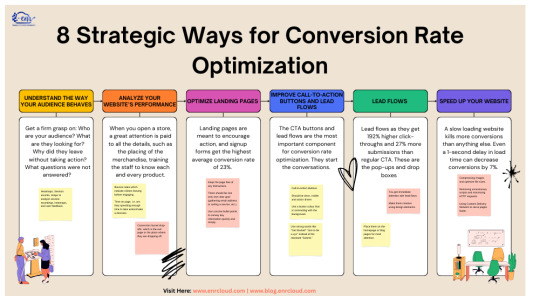
0 notes
Text
Enhancing Customer Experience Through Digital Transformation
In today's digital era, Digital Transformation is pivotal in reshaping how businesses interact with their customers. By integrating advanced technologies, companies can offer personalized and seamless experiences that meet evolving customer expectations. For instance, organizations like Netflix and Amazon utilize data analytics to tailor content and recommendations, significantly enhancing user satisfaction. Moreover, the adoption of omnichannel strategies ensures consistent and efficient customer interactions across various platforms. Embracing digital transformation not only streamlines operations but also fosters stronger customer relationships, driving loyalty and business growth.

0 notes
Text
Top 10 Benefits of Data-Driven Decision Making in 2024
In 2024, Data-Driven Decision Making (DDDM) stands at the forefront of strategic business operations. By leveraging data analytics, organizations can make informed choices that enhance efficiency and drive growth. For instance, companies like Hugo Boss have invested in data hubs to optimize product design and marketing strategies, leading to increased sales and customer satisfaction . In the healthcare sector, data-driven models have been employed to allocate preventive care effectively, resulting in significant cost savings and improved patient outcomes . These Data-Driven Decision Making Examples illustrate the transformative power of data in various industries. Embracing data-driven decisions enables businesses to anticipate market trends, personalize customer experiences, and maintain a competitive edge in an increasingly data-centric world.

0 notes
Text
Understanding Behavioral and Psychographic Segmentation: A Smarter Approach to Targeting
In today’s competitive market, understanding your audience goes beyond basic demographics. Behavioral Segmentation and Psychographic Segmentation are powerful marketing tools that help brands connect with customers on a deeper level. While behavioral segmentation focuses on user actions like purchase history, loyalty, or usage rate, psychographic segmentation dives into values, interests, lifestyle, and personality traits. This combination allows businesses to craft more relevant, personalized campaigns that truly resonate. By integrating both behavioral and psychographic insights, marketers can predict future buying patterns, increase customer satisfaction, and drive higher ROI. Whether you're in e-commerce, SaaS, or retail, leveraging these segmentation strategies ensures you're reaching the right audience with the right message at the right time. This article explores how to implement both segmentation methods effectively and why they are essential for modern marketing success.
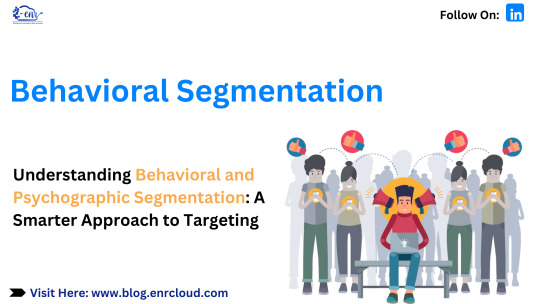
0 notes
Text
WhatsApp Chatbot: What People Also Search for & Why It Matters in 2025
Curious about what drives interest in WhatsApp automation? When users explore WhatsApp Chatbot solutions, one common query you’ll find under People Also Search for includes related tools, customer service automation, and AI chat solutions. This growing trend highlights the demand for real-time engagement and 24/7 support. Businesses are increasingly adopting WhatsApp chatbots to streamline communication, boost customer satisfaction, and drive conversions through personalized interactions. In this article, we dive into why WhatsApp Chatbots are trending, what related terms people are searching for, and how you can use this insight to shape your digital strategy. Whether you're a marketer, business owner, or tech enthusiast, understanding these search behaviors can give you a competitive edge.

0 notes
Text
Understanding Segmentation, Targeting and Positioning (STP Marketing) for Business Growth
In today’s competitive market, reaching the right audience with the right message is more important than ever. That’s where Segmentation, Targeting and Positioning (STP Marketing) comes into play. This marketing model helps businesses identify and approach their most valuable customers, ensuring that their message resonates effectively.
STP Marketing stands for Segmentation, Targeting and Positioning, a strategic approach that allows marketers to identify distinct consumer groups and deliver tailored messages. This framework is widely used across industries to develop customer-centric marketing campaigns.
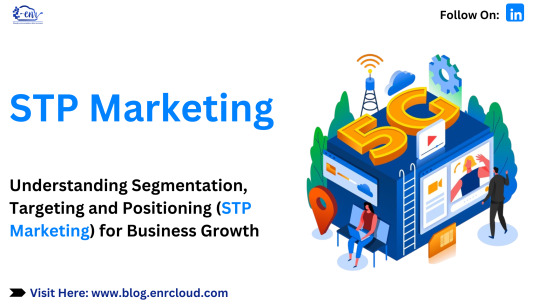
0 notes
Text
How Personalization Can Reduce Cart Abandonment Rates Across Industries
Personalization is becoming a powerful tool in eCommerce, especially when it comes to addressing high cart abandonment rates. By tailoring the shopping experience to individual customer preferences, businesses can significantly reduce friction and increase conversion rates. Understanding the cart abandonment rate by industry is essential to identify benchmarks and set realistic goals. For instance, while the fashion industry may face different challenges than electronics or travel, all sectors benefit from implementing personalized product recommendations, dynamic retargeting, and customized email follow-ups. These strategies not only remind customers of what they left behind but also create a sense of urgency and relevance. With shoppers expecting more from online experiences, businesses that prioritize personalization are better positioned to lower their cart abandonment rates and boost overall revenue. Dive into the data and discover how your industry compares—and what steps you can take to stand out and retain more customers.

0 notes
Text
Competitive Marketing Strategy: How to Drive Business Growth & Gain a Lasting Advantage
In today’s crowded market, a strong competitive marketing strategy is key to business growth and long-term success. But how do you stand out and create a real competitive advantage?
Whether it’s through unique branding, pricing tactics, or customer experience, businesses that master competitive strategy outperform rivals. Take inspiration from competitive advantage examples like Apple’s innovation, Amazon’s logistics, or Nike’s emotional branding—each dominates by differentiating itself.
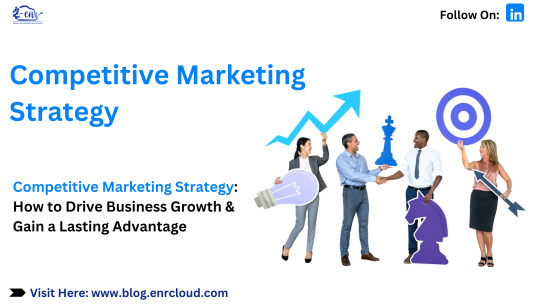
#Competitive Marketing Strategy#Business Growth#Competitive Advantage#Competitive Strategy#Competitive Advantage Examples
0 notes
Text
The Dawn of RCS Business Messaging: A New Era in Customer Communication
The Dawn of RCS Business Messaging marks a significant turning point in how brands connect with their customers. Rich Communication Services (RCS) is rapidly emerging as the next-generation messaging platform that surpasses the limitations of traditional SMS. With features like high-resolution media sharing, read receipts, typing indicators, and interactive buttons, RCS allows businesses to deliver a more engaging, app-like experience directly within a user’s default messaging app.

0 notes
Text
Mastering Funnel Analysis: Optimize Every Step of the Customer Journey
Funnel Analysis is a critical process that helps businesses understand how users move through different stages of the customer journey, from awareness to conversion. By tracking and analyzing user behavior at each step, companies can pinpoint where potential customers drop off and identify opportunities for improvement. With effective Funnel Analysis, marketers and product teams can optimize their sales, marketing, and onboarding processes, ensuring higher conversion rates and better customer experiences.

0 notes
Text
Boost Customer Engagement with WhatsApp Chatbot and WhatsApp Marketing
In today’s fast-paced digital world, businesses are turning to innovative tools like the WhatsApp Chatbots to enhance customer interaction and drive conversions. A WhatsApp Chatbots automates conversations, answers customer queries instantly, and provides seamless support 24/7, creating a smoother customer experience. When integrated with a strong WhatsApp Marketing strategy, brands can reach their audiences directly, send personalized messages, promote new products, and nurture long-term relationships.
With over 2 billion users globally, WhatsApp is a goldmine for businesses looking to boost engagement and increase sales. Whether you're sending promotional offers, providing customer service, or conducting surveys, combining a WhatsApp Chatbots with effective WhatsApp Marketing techniques can transform your communication approach. Stay ahead of the competition and leverage the power of WhatsApp to build trust, drive loyalty, and grow your business exponentially.

0 notes